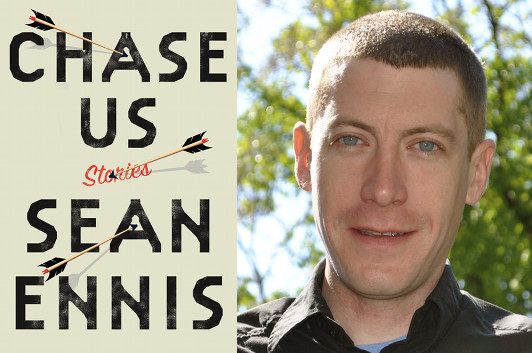Sean Ennis: An Unsettling “Orientation”

photo: Claire Mischker
The Philadelphia of Sean Ennis’s Chase Us is a surreal, violent territory, one that the narrator navigates precariously from one story to the next. The collection isn’t so much a novel in stories, I think, as a series of variations on a theme; although the setting and the characters carry over from one story to the next, it doesn’t seem—at least initially—that a linear narrative carries over with them.) Once you’ve read a few of Ennis’s stories, you might be able to see what drew him to the Daniel Orozco story he’s written about in this guest essay…
I’ve always liked stories about work. Not only is it the place where most of us spend the majority of our time, but for a fiction writer, it seems like the ideal setting to create drama. Unless you’re very lucky, work is a place where you are often forced to interact with people you’d otherwise avoid.
Daniel Orozco’s “Orientation” takes the form of a dramatic monologue given by a middle manager introducing a new employee to the company. The specific work that this office engages in is never really mentioned, but we quickly get the sense that the audience for this speech has not exactly landed the ideal job.
In a lesser writer’s hands, it is easy to imagine this piece functioning as a one-note gag, riffing on the banal idea that office life is alienating and unfulfilling. No doubt, that idea is in Orozco’s story, but he’s mainly done with it after the first page. Instead, what follows is a list of an increasingly terrifying cast of characters who inhabit this particular office, brutally dissected by the narrator who speaks of the rules of the coffee pool and the sadomasochistic habits of his coworkers with an equally detached tone.
What I love and admire about this story is the way that both form and content are working in tandem. First, form. As a dramatic monologue, it places the reader in the position of the new hire being oriented, evaluating his/her new job for the first time. By the end it leaves the reader with a choice—decide to return for the second day on the job or run away screaming. I’m not suggesting that the story is so immersive that the reader actually forgets where they really stand—this isn’t a Disney ride. But it does mimic the question lots of people have about their job when they leave it for the day: will I come back tomorrow? While most great stories pose a question to the reader on some level, this seems much more explicit.
8 June 2014 | selling shorts |

 Our Endless and Proper Work is my new book with Belt Publishing about starting (and sticking to) a productive writing practice.
Our Endless and Proper Work is my new book with Belt Publishing about starting (and sticking to) a productive writing practice. 
